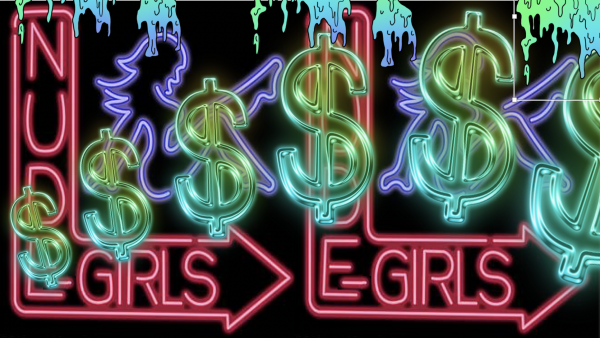Perversion can never be stripped of shame.
The Marketplace of Brain Worms

Talk of the free market is laughable when it comes to porn.
Helen Andrews has sounded the alarm. That alarm is not an emotionally detached lamentation of our cultural decadence and slide into neo-paganism, but a gut-wrenching cri de coeur intended to persuade both those on the Left and the libertarian “Right” of the need to crack down on Big Porn. Andrews is on sound footing when she decries how evolving technology has sufficiently metastasized our pornography public health crisis so as to render hollow effete classical liberal bromides about simply letting parents do their jobs.
A more muscular approach to Big Porn is indeed needed: One that rises above intellectual sclerosis, institutional inertia, and the reflexive aversion of many would-be allies to wield the levers of political power to “enforce morality.”
As Jesse Merriam demonstrated, there are no legally preclusive strictures that would prohibit a political assault against pornography. The Supreme Court has never asserted—nor could it possibly assert—a First Amendment “right” to manufacture, distribute, or possess smut. On the contrary, obscenity was oftentimes a jailable offense at the time of the American Founding. Merriam cites the scholarship of Hillsdale College’s Thomas West to posit that “there was a broad consensus” at the time of the Founding “that the government not only may but should prohibit any speech that tends to undermine adherence to the Christian faith and traditional family relations—the twin pillars of the American social and moral order.”
The law, in short, is not a hindrance. As Andrews writes, the leading obstacle to genuine political reform is therefore a distinctly cultural one. Ironically, however, that cultural obstacle standing in the way of pornography reform is a nebulous derivative of “free speech” legal principle: Namely, a seductive Enlightenment-inspired faith that the proper cure to harmful “speech” is here, there, and everywhere just healthier “speech.”
Our problem is therefore a misplaced elevation of the notion of the “marketplace of ideas” to an undeservedly lofty pedestal—if not to the position of an outright societal panacea. In so doing, especially in the context of utterly noxious content such as pornography, we have sapped ourselves of the ability to advance forthright moral argumentation about the inherent value of ideas and content. Philosophical liberals of the both the left- and right-leaning variety have vitiated the “marketplace of ideas” and neutered it into a marketplace of brain worms.
Free speech absolutism and a concomitant faith in the power of good ideas to triumph over bad ideas, already ideals with more ivory-tower theoretical appeal than tangible historicist support, are wholly misplaced in the pornography debate. At the risk of stating the obvious, there is nothing “speech”-like about pornography—an industry inextricably linked to human trafficking, lacking any plausible “redeeming” value whatsoever and instead explicitly appealing to the prurient interest. The very act of relying upon the pluralistic “marketplace of ideas” to counter that “speech” therefore amounts to complicity in a fundamental lie: That pornography itself and religious/ethical/cultural/social criticism of pornography are equally deserving of a place in the public discourse.
Resorting to the “marketplace of ideas” platitude strips culture war interlocutors of their most potent rhetorical weapon: The ability to make justice– and inherent-value-themed arguments about smut. By acceding to the lie of the “marketplace of ideas” as a cure-all, we assume “that we cannot and should not distinguish between good and evil, argument and obscenity, truth and falsehood,” as Matthew Schmitz aptly writes. The currency of conservative public discourse must resist the temptations of post-Enlightenment pluralism and procedural fetishization.
It is long past time for us to return home to the more evocative discursive terrain of yesteryear: Justice, human flourishing, virtue, and truth. “The notion of liberty was always attended by the awareness of the distinction between liberty and license,” Hadley Arkes writes, and we on the Right would do well to revitalize that crucial distinction—lest we fall victim to true moral relativism, properly understood. Whatever John Stuart Mill may have said about the necessity of free expression and the pitfalls of censorship in On Liberty, surely he did not intend to rob future societies of the ability to argue that teenagers should not carry around an endless supply of violent orgy videos in their pockets.
The “marketplace of ideas” talking point also fails, in the context of pornography, for yet another compelling reason: Human physiology. “A scientific consensus is emerging that today’s porn is truly a public health menace: Its new incarnation combines with some evolutionarily-designed features of our brain to make it uniquely addictive, on par with any drug you might name—and uniquely destructive,” Pascal-Emmanuel Gobry observes. “The evidence is in: Porn is as addictive as smoking, or more, except that what smoking does to your lungs, porn does to your brain.” There are serious, ruinous health externalities to America’s debilitating porn addiction—and ruinous health externalities are quintessential reasons to regulate human conduct. There are very real, and very unsettling, neurochemical effects on the human brain from exposure to what Gobry calls the “always-on kaleidoscope of sexual novelty.” It is not merely inadequate, but actually farcical, to suggest “more speech” as the only desirable remedy for such an epidemic.
The American Right’s single biggest intellectual capitulation over the past three to four decades has been the unilateral disarmament of all justice-based public policy advocacy. The Left, ever hegemonic, has sought to fill that void via the proliferation of “social justice”-imbued public policy. But leftist “social justice,” of course, is a bastardization of the entire overarching enterprise. The Right must reclaim the moral beachhead of argumentation rooted in justice and truth, which necessarily means eschewing the talking point of hacks and morons that is trite faith in a values-neutral “marketplace of ideas.”
The American Mind presents a range of perspectives. Views are writers’ own and do not necessarily represent those of The Claremont Institute.
The American Mind is a publication of the Claremont Institute, a non-profit 501(c)(3) organization, dedicated to restoring the principles of the American Founding to their rightful, preeminent authority in our national life. Interested in supporting our work? Gifts to the Claremont Institute are tax-deductible.
Aristotle points the way to true virtue through free will.
The case of pornography.
The American people have become acolytes of a religion of the flesh.
How to find our way out from our culture-wide sex addiction.
Pornographic technology has turned sensory overload into sensory degradation.






